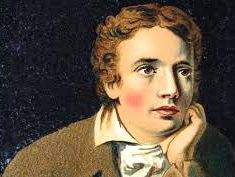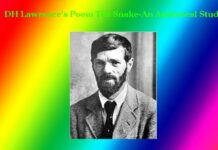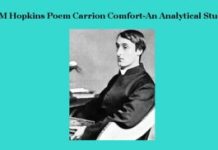John Keats | The Use of Greek Myths in Hyperion
John Keats | The Use of Greek Myths in Hyperion
John Keats | The Use of Greek Myths in Hyperion
John Keats’s (1795-1822) ‘Hyperion’ is a narrative poem in epic style written in three books often said to have been left incomplete. It is a poem on Greek mythology the theme of which is ousting of the old system of the regime by the new one. The poem shows that the two sets of gods as- the Titans and the Olympians are in a war and how the Titans were replaced by the Olympians of their power. The Titan set of gods includes- Saturn, Hyperion, Oceanus, Clymene Enceladus, Thea and some others. They symbolize the old system of the regime. On the other hand, the Olympian set of gods and goddesses includes- Jove (Zeus), Hades, Poseidon, Apollo, Mnemosyne and some others. They represent the new system of the regime. The poet John Keats has brought the myth into account in three books which may be recounted briefly as below:
The story of the poem begins in the middle after the style of Milton’s Paradise Lost. With the opening of Book I, we see that the war between the Titan set of gods and the Olympian set of gods is over. Saturn the leader of the Titans is defeated and he is sitting in solitude lamenting the loss of the war. Then Thea, the spouse of Hyperion comes to Saturn and tries to console him, but she keeps weeping sitting at the feet of Saturn. But Hyperion says that they must fight to restore Saturn to his throne, because if Saturn is not restored, then Hyperion will also lose his throne. Hyperion says:
”Saturn is fallen, am I too fall
And to leave this heaven of my rest.”
In Book II, we see that Thea has led Titan to the other Titans to discuss the reasons for their defeat and what they should do next. Most of the Titans suggest that they should fight to recover their power. But Oceanus and Clymene are the exceptions. In the conference, Oceanus says that change is natural and they should accept their defeat. He says:
”We fall by course of Nature’s law, not force
Of thunder or of Jove.”
Then Clymene, a Titan goddess begins to make music to soothe her grief at their defeat. Suddenly more beautiful music overpowered her music. She heard Apollo’s name being called out which indicates that Apollo will be the hero of the new set of gods and of a new system of the regime.
In Book III, we see that Apollo is with his sister Artemis in Delos. Apollo has never been out of Delos and therefore is ignorant. But Mnemosyne the goddess of Memory and the mother of the Nine Muses renders Apollo the knowledge of sorrow and sufferance by mystic communion with him. Since the Titans refuse to accept the change they lose their divine power. On the contrary, Apollo becomes the god of the new order because he makes the sorrows of the world his own.
This myth of the gods may be interpreted in two ways, as- a political allegory and as a philosophical poem on poet and poetry. Let us interpret the poem as below:
First, we can interpret it as a political allegory (An allegory is a narrative of a subject under the guise of another similar subject). Some writers use allegory to evade censorship and as they cannot criticize the government openly, so they do it in disguise by means of allegory. In the poem, ‘Hyperion‘, the Titan set of gods represents the monarchy of the old system who do not like change. Reference may be made to the French Monarchy which was overthrown by the new ideals of Democracy. Here the Olympian set of gods with the leadership of Apollo represents the new system of administration called Democracy. Through the poem, the poet John Keats wants to convey that the act of governing should go to those who have the knowledge of the sorrow and sufferance of the world.
Secondly, it may be interpreted as a philosophical poem about poets and poetry. This is shown by Keats when he says in regard to Apollo that he dies to live. The pang that he suffers at his birth symbolizes purgation and inspiration for creative art. Like the god of poetry, the living poet has the pang of being genuinely creative. The earthly poets achieve perfection through struggle. 0 0 0
John Keats | The Use of Greek Myths in Hyperion
Read More: Salient Features of John Donne’s Poetry
John Keats | The Use of Greek Myths in Hyperion
N. B. This article entitled ‘John Keats | The Use of Greek Myths in Hyperion’ originally belongs to the book ‘Critical Essays on English Poetry‘ by Menonim Menonimus. John Keats | The Use of Greek Myths in Hyperion
Books of Literary Criticism by M. Menonimus:
- World Short Story Criticism
- World Poetry Criticism
- World Drama Criticism
- World Novel Criticism
- World Essay Criticism
- Indian English Poetry Criticism
- Indian English Poets and Poetry Chief Features
- Emily Dickinson’s Poetry-A Thematic Study
- Walt Whitman’s Poetry-A Thematic Study
- Critical Essays on English Poetry
- Tawfiq al-Hakim’s Novel: Return of the Spirit-An Analytical Study
- Tawfiq al-Hakim’s Novel: ‘Yawmiyyat Naib Fil Arayaf’-An Analytical Study
- Analytical Studies of Some Arabic Short Stories
- A Brief History of Arabic Literature: Pre-Islamic Period …











